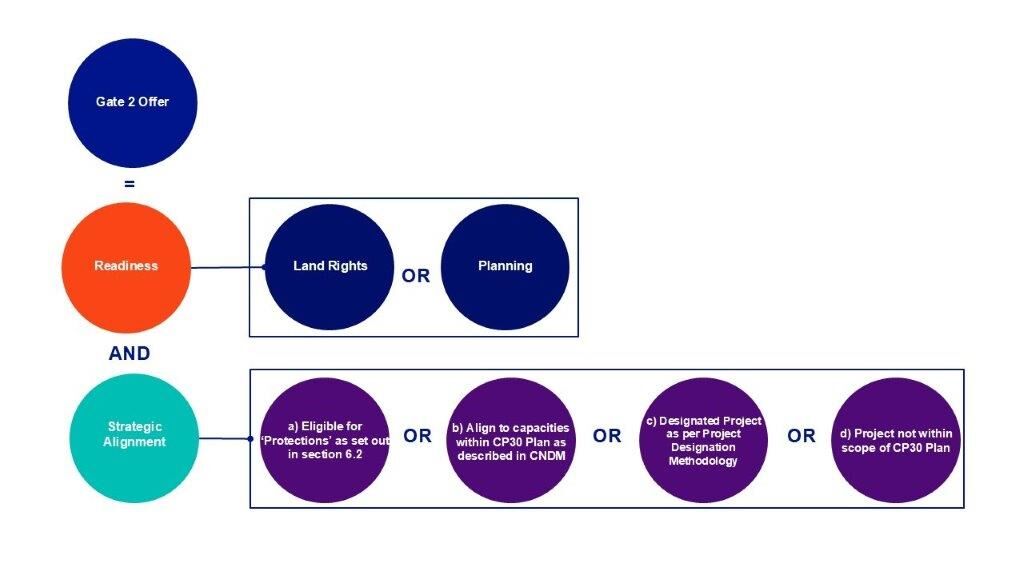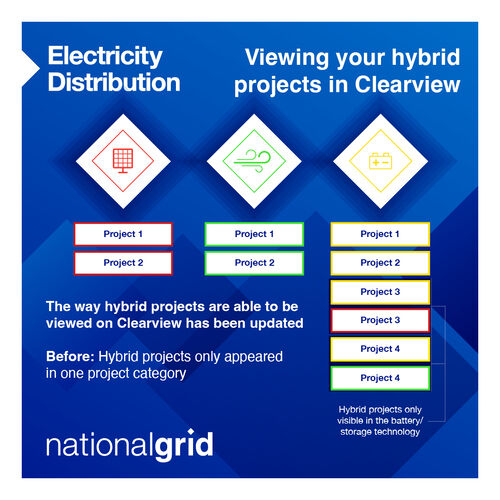{{ vm.autoCompleteLoadingText }}
Should a generator either be unsuccessful in the Gate 2 process or fail to submit the requisite evidence, the project will be assigned a Gate 1 allocation and will receive a Gate 1 offer. This Gate 1 offer provides an indicative date, cost, and location for connection to the network but does not secure a place in the connections queue.
Additionally, customers that wish to reduce thier capacity to 4.99MW or below during the Gate 2 process can do so. However, they are still required to complete the Gate 2 evidence form to formally signal the reduction, and will also need to submit an updated G99 form based on the new capacity (this is to facilitate a technical review of the impact of the reduced capacity).
To be eligible for the upcoming Gate 2 submissions and assessments process later this year—referred to as Gate 2 to Whole Queue (G2TWQ)—all relevant project contracts must be signed with NESO and/or the appropriate DNO. This requires that your TIA project had commenced prior to the NESO Pause, which began on 29 January 2025. To meet this 29 January cut-off, NGED customers were required to have signed their DNO contracts by the specific deadlines listed for each GSP on this page.
The Gate 2 criteria have been defined to better allocate confirmed connection dates, connection points, and queue positions to projects that are viable, progressing, and aligned with the strategic CP30 plan. To receive a Gate 2 offer, a customer’s project must meet both the Gate 2 Readiness Criteria and one of the Gate 2 Strategic Alignment Criteria. The detailed requirements are outlined in the Gate 2 Criteria Methodology.
Please see the diagram below setting out how the criteria can be met.

Projects must meet the Gate 2 Readiness Criteria through either the land route or the planning route. Projects using the land route may also need to provide planning evidence if they are aiming to meet Strategic Alignment Criteria ‘a’ (protections), or for queue formation purposes if they have submitted a planning application. Please see diagram setting out how readiness can be achieved.
In addition to fulfilling the Gate 2 Readiness Criteria, projects falling within the scope of the G2TWQ Connections Reform must also meet the Gate 2 Strategic Alignment Criteria to be eligible for a Gate 2 Offer.
There are four possible Strategic Alignment Criteria, and customers must meet at least one of the following:
A diagram of how the strategic alignment criteria can be met is listed out in this diagram.
To submit your evidence, you will need to complete our web form that will have been emailed to your key project contacts. Before you start, please ensure you have all the pdf documents ready to submit, as the form cannot be saved.
To help you prepare for submission you will need to read these key documents here.
In addition to the key documents, we have posted our most recent webinar which includes a demonstration of the NGED Gate 2 evidence submission form. This demonstration starts at around minute 27 of the webinar with information slides about Gate 2 evidence at the start and an NGED team panel Q&A session at the end.
To find out your firm transmission connection date, please use Clearview.

Our customers raised a query about being unable to see hybrid projects in the solar and wind connections pipeline.
This is the latest NGED customer Connections Reform webinar recording that gives a demonstration of our evidence submission form. The NGED guidance accompanies the form and will walk customers through the process.
We recognise that this is a period of change and want to ensure that you are kept informed. This monthly webinar is for customers and stakeholders who would like to keep up to date with Connections Reform changes. This webinar is interactive, and we would like to hear your views during the call.
You can find the slide decks from the previous webinars below.
Our webinars aim to provide you with valuable insights and updates on Connections Reform, specifically tailored to NGED customers.
We are excited to invite you to our next Connections Reform Webinar on Wednesday 25 February 2026, from 10:00-11:00 AM.
Register now to secure your place and receive all the information you need to join the session. You can also pre-submit a question about Reform upon registering.
If after reading the content on this page you have a further question, you did not receive any verification email or you want to provide feedback about our webinars or supporting material, please contact the reform team on box.connectionsreformnged@nationalgrid.com. Please bear with us, we are experiencing high numbers of queries, and so we aim to get back to you within 7 days.
For further information, please reach out to our dedicated inbox.
For complaints relating to Connections Reform, please see our guidance.